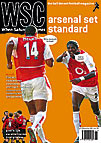 Ian Farrell follows the tetchy career of a player highly rated by Johan Cruyff, but who proved to be an unsatisfactory replacement for Jason Wilcox
Ian Farrell follows the tetchy career of a player highly rated by Johan Cruyff, but who proved to be an unsatisfactory replacement for Jason Wilcox
Depending on how sympathetic you are towards them as a species, Richard Witschge is either a typical Dutch player or the sort that unfairly gives them a bad name. Arrogant, outspoken, not quite as talented as he thinks he is and ultimately destined to underachieve big time. Mix these characteristics with the floppy hair, three-day stubble and permanent sulk of a long lost Gallagher brother, and the result is no British manager’s idea of a trouble-free pro.
Like most significant Dutch footballers, Witschge was part of an Ajax “wave”, in this case Cruyff’s late 1980s version. Though no vintage, fellow graduates did include Dennis Bergkamp and the De Boers, yet it was he who was rated highest by the coach (even if much of this affection was due to an “attitude” Cruyff saw in him rather than outstanding ability) and who was the one player to follow him to Barcelona.
This faith proved largely unfounded and two mediocre seasons lead to a move to Bordeaux. Initially impressive alongside a young Zidane, a falling out during 1994-95 saw him frozen out of the first team. Salvation would come in the unlikeliest of forms: Jason Wilcox’s cruciate ligament. Blackburn, desperate to avoid losing momentum as they closed in on the title, suddenly needed a talented and temporarily available left-sided player. Witschge seemed as a good a solution as any and headed off to his fourth country.
Big mistake. A man engineered in the Ajax laboratories and used to swanning around the most chic cities in Europe now had to spend his days listening to the thoughts of Alan Shearer and his nights searching forlornly for Blackburn’s beautiful people. He did not fit in. Before long, Kenny Dalglish resorted to playing Graeme Le Saux out of position to fill the Wilcox role.
How did it come to this? A player marked as a future star sitting in the Ewood Park dug-out watching a throwback team and a converted full-back in his place . His opinion was clear and damning – I’m too good to get in this team. So good that he made just one appearance.
If Dalglish expected him to buckle down and uncomplainingly fight for his place, he had hopelessly misjudged the player. The relationship turned sour within weeks. When Blackburn finally clinched the title, he slunk away from the party, unnoticed and unmissed, back to France.
The extent of his dissatisfaction was made brutally clear a year later in a Sunday newspaper article before Holland’s Euro 96 game with England. Witschge’s attacks, not just on the club but the town itself, managed to set new standards for vitriol. Rovers’ “direct” tactics were savaged, as were the abilities of his fellow players, and Le Saux in particular. “He was just a simple left-back. He really struggled when he had the ball. He’s just a worker like most English players.” Blackburn as a place was given similarly short shrift. He seemed shocked that it wasn’t like Barcelona or Amsterdam: “[It] is so poor and ugly. I couldn’t bear to live there one more day – the people looked so poor. I wanted to play in England but you can’t do that to your family. The only place to play in England is London.” That thought certainly overrode any aversion to sour-faced Scottish managers – in December 2000 he came perilously close to signing for George Graham’s Spurs.
He eventually returned to Ajax and for a while proved a rare bright spot in a period of decline. But he just couldn’t keep that mouth shut. A dip in form, coupled with one piece of unwanted advice too many, gave coach Co Adriaanse his chance. He handed his place to the 18-year-old Rafael van der Vaart and banished Witschge to a loan spell at Alavés, enabling a Camp Nou return met with supreme indifference.
That should have been that: a career ruined by arrogance. But not quite. Good performances in Spain and the appointment at Ajax of the more sympathetic Ronald Koeman has handed Witschge another chance in Amsterdam. The key to this resurrection might be found in a fascinating documentary on the club’s centenary season. In one scene, the board seem keen to dispose of Witschge, until technical director Danny Blind fights his corner. The former captain, like Koeman, could see something that the layman could not: a part of the soul and psyche of Dutch football. A dark side yes, a volatile presence capable of creating as many problems as it might solve, but a fundamental cog in the Netherlands machine nevertheless. Or maybe they just want a nutter to shout and kick people.
From WSC 189 November 2002. What was happening this month